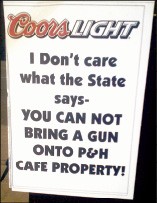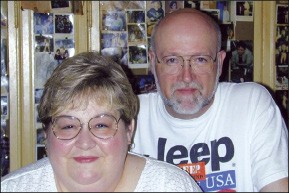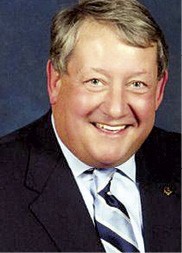There is a small sign hanging on the smudgy glass door of the
P&H Cafe, an eclectic watering hole in the heart of Midtown.
Printed on Coors Light stationery, its message is clear: “I don’t care
what the State says — YOU CAN NOT BRING A GUN ONTO P&H CAFE
PROPERTY!”
 chris davis
chris davis
P&H proprietor Bob Heaton was among the first restaurant owners
to publicly condemn legislation allowing carry-permit holders to pack
heat in places where liquor is served. (Note to Heaton: If Governor
Phil Bredesen affixes his signature to House Bill 0233, your sign won’t
mean much. Legally, it’s got to be bigger, and it’s got to contain
specific language.)
There are a lot of things bar and restaurant owners still don’t
understand about the bill. And, in its current form, there’s a lot
they’re not comfortable with.
“I had no idea that you couldn’t just put up a sign that says ‘No
Guns Allowed,'” says Murphy’s owner Benny Carter. Like most of the bar
owners contacted for this story, he doesn’t have a firm grip on the
details of the bill. “It’s like something they decided to fast-track in
Nashville. Not one person asked my opinion,” says Carter, who started
playing music in bars before he was old enough to drink and who has
worked in the hospitality industry most of his adult life.
“I haven’t decided if I’m going to put up a sign or not,” he adds
cautiously, before voicing a complaint that’s been echoed by bar and
restaurant owners across the state: “Why is it that nobody who works in
the hospitality industry is ever consulted when they make these laws.
… We — the owners — end up being responsible for
everything.”
John Elkington, CEO of Performa, the real-estate company that leases
Beale Street, agrees with Carter’s assessment and gives it a folksy
spin. “My mama always said that nothing good ever happens after
midnight,” he says, adding that, in his experience, concealed guns and
late-night clubs where alcohol is served don’t mix. “After all my years
of working on Beale Street, I completely agree with my mama, and I
strongly oppose this legislation.”
Elkington says he can imagine plenty of compromises, such as
creating exemptions for historic districts like Beale or including a
curfew. He’s confident that if Bredesen vetoes the legislation, bar and
restaurant interests will have enough time and leverage to get the bill
amended.
“If the governor vetoes the bill, I’m going to Nashville and I’m
going to push,” says Elkington, quoting recent headlines regarding gun
crimes committed by trained and licensed carriers. “I know Curry Todd,
the [Collierville] representative who introduced this legislation, and
I think he’s an intelligent man — above the norm for the state
legislature. I don’t know what he was thinking.”
Preston Lamm of River City Management (Rum Boogie Cafe, Pig on
Beale, and other Memphis restaurants) describes HB 0233 in two simple
words: “really crazy.”
“I am going to post notice that there are no guns allowed. I believe
we will probably do that with all the Beale merchants very soon,” Lamm
told Flyer senior editor John Branston.
Bud Chittom, owner of Blues City Café and other downtown
businesses, agreed with Lamm’s assessment but also says he understood
the desire to prevent “a “Columbine-style shooting.”
“I have a gun permit,” Chittom says. “I don’t want to be a victim.
But in a bar it’s going to be hard to keep [customers] from mixing
alcohol and marksmanship.”
“It’s like somebody said recently: Even in the Wild West, they knew
enough to check their guns at the door,” Elkington says.
Newby’s owner Todd Adams, like Chittom, is an advocate of
self-defense and the Second Amendment, but he fears what may happen
when mixing guns and alcohol.
“It’s hard enough dealing with an intoxicated person,” Adams says.
“I would hate to have a confrontation with a drunk carrying a gun.”
To be clear, it’s still a crime to drink and carry a gun, and HB
0233 doesn’t make it legal. In addition, anyone who waves a gun in a
drinking establishment for any reason other than to stop a violent
crime faces time in jail. If they’ve been drinking, they could lose the
right to own and carry a concealed weapon.
That’s cold comfort for opponents of the legislation, like state
senator Beverly Marrero (D-Memphis), who’s mocked the legislation with
a deadpan observation: “Bars exist to facilitate drinking.”
Memphis police director Larry Godwin is only a little less acerbic,
scolding Tennessee’s legislative body for worrying about “letting guns
into bars” instead of “putting crooks behind bars.”
“Drinking affects your decision-making,” Godwin says. “I don’t think
you can ever safely mix guns and alcohol.”
Blue Monkey owner Mike Johnson also is perplexed. “I don’t see the
point in any of this,” he says. “I can’t figure out what problem the
bill is fixing.”
He understands that support for HB 0233 probably extends beyond the
3 percent of Tennesseans who hold carry permits but says he has never
heard any public demand for allowing guns in bars.
“I can’t figure out where all of this is coming from,” he says.
Not everybody in the bar business gets white-knuckled over the
prospect of having a few more shooters at their bar. Memphis Restaurant
Association president Mike Miller was sharply criticized by an MRA
member for sending an e-mail blast informing restaurant owners about HB
0233.
However, the only bar owner the Flyer could find who strongly
favors the legislation as it currently exists would only agree to be
quoted under the condition of anonymity. He calls the Flyer‘s
reporting on the subject “not good” and based on a “false premise.” He
then blasted The Commercial Appeal for publishing a series of
articles about permit holders who were less than responsible with their
guns. He says the CA‘s flagging of “nine out of 30,000 permit
holders in their vetting process” only confirmed his belief that
legally armed citizens are an exceptionally law-abiding
demographic.
 chris davis
chris davis
Nancy and Bob Heaton of the P&H Cafe
“I’m only talking to you because the media has blown everything out
of proportion, and I want people to have some facts,” he says. “You can
describe me as a bar owner and as a handgun instructor but don’t use my
name. I don’t want a target painted on my back in a city where there
are 15,000 gang-bangers.”
The bar owner reiterates that HB 0233 is for civilized people who
only want to eat lunch at Applebee’s.
“There’s been no increase in shootings in states that have the same
laws,” he notes, describing the handwringing by local bar owners as
“ridiculous,” because it assumes that gun owners who’ve gone to the
trouble of obtaining a legal carry permit will turn around and break
the law by drinking while carrying.
“I’m not worried about the guy legally carrying a gun sitting a
couple of tables down from me,” he says. “I’m worried about that guy I
run into in the parking lot.”
He says he won’t be hanging a “No Guns” sign in his establishment,
because he thinks letting gang-bangers know you’re a “gun-free zone” is
an invitation to trouble.
Elkington, Carter, Johnson, and Adams have heard arguments for the
legislation and have mixed sympathies, but they still think the policy
is problematic and worry that they’ll be forced to deal with patrons
who are loaded in every sense of the word.
“Our security people don’t even carry guns,” Elkington says. “I
can’t imagine that [bar operators] won’t see an increase in insurance
costs if guns are permitted in places where alcohol is served.”
“I don’t understand why this is being done,” Elkington says. “There
is no compelling reason to change the law. It makes no sense.”
Carter is concerned about a lose/lose situation for bar owners,
whether they post a no-gun sign or not.
“You’re not supposed to carry and drink, but how do I know whether
or not you have a weapon, if that weapon is concealed? Do I have to pat
down everybody who walks in the bar? Or incur the expense of a metal
detector to be fair to everybody? There’s always the possibility of
lawsuits that result from people who drive away from my place drunk and
get into trouble. I don’t see how this will be any different.”
Says Johnson: “We don’t have bouncers at the Blue Monkey. We train
our people to decelerate situations, not accelerate them.”
The Opposing View
A few weeks back, Flyer senior editor Michael Finger wrote a
first-person story on obtaining a Tennessee gun-carry permit. He was
trained for his certification at Rangemaster of Memphis. Recently, he
conducted a follow-up interview with instructor John Parker and
Rangemaster owner Tom Givens regarding Tennessee’s proposed less
restrictive gun-carry laws.

Tom Givens
Michael Finger: Is it true in Tennessee that the gun does not
have to be concealed?
John Parker: That’s correct. There’s no requirement for it to
be concealed. The reason Tennessee did that is not so you can wear it
openly; it’s so that if your garment is blown back by the wind or
something, technically you are not breaking the law.
What is the problem with someone wearing a gun openly?
It could cause problems if you ran into a policeman, and there are a
lot of people who don’t like the idea of this, so you get into a
situation where you might disturb some people.
I don’t understand why they are passing these laws about guns in
bars and parks, because it seems there is an exception to these laws:
Even if you take a gun into a place where it’s prohibited, if you use
it in self-defense you are okay.
Legally speaking, yes. If you wear one in a place you’re not allowed
to, and you use it in self-defense, then legally you’re not going to be
charged with it.
Let me ask you, Tom Givens, the same question: Since you’re
already protected if you use your gun in self-defense, aren’t these new
laws really pointless?
Tom Givens: Well, not really. Let me give you some historical
background. When the permit statute was passed in 1996, the prohibition
that prevents carrying a gun into a place that sells alcohol was not a
part of that statute. It predates that statute by a number of
years.
At the time that law was passed, in 1996, there was no way for a
private citizen to carry a gun legally in this state. The law against
carrying a gun into a place that sells alcohol was one of the
enhanced penalties for carrying a pistol illegally. After the
Stockton school shooting, they put in a separate statute that made it a
higher penalty to carry a gun into a place that sold alcohol and a
higher penalty into a school and other places.
So it wasn’t that the permit law said you can’t carry a gun into
these places, it said that nobody can carry a gun into these
places. In fact, it’s illegal for a police office who’s off-duty to
carry a gun into those places, because of the enhanced penalty laws
that came into being in the ’80s.
They simply left that language out of the carry-permit law, and they
are trying to put that language back in. So this permit would exempt
people from the enhanced penalties.
Thirty-seven other states allow permit holders to carry guns into
places that sell alcohol, so this is not some unique thing that
Tennessee is attempting. It’s legal in Mississippi, in Georgia. In most
places, if you have a permit, it’s legal to go into a place that sells
alcohol, as long as you are not drinking.
But doesn’t that put a burden on the bar or restaurant to “card”
everyone to determine if they’re carrying and trying to drink?
No. The carry statute says it very plainly: They have to put a sign
up by the door that says “No Guns Allowed.”
I understand the sign has to be a certain size with very specific
language.
Yep, but all you have to do is go to Kinko’s and have one made. It
has to say the right thing. But they have the option of doing that if
they don’t want people with gun permits to bring guns into their
places.
What if they do want permit-holders in their places?
Then, they just do nothing.
But those people still aren’t allowed to drink alcohol?
There’s a separate statute in this state. Again, it’s not a part of
the carry-permit statute. It’s a Class A misdemeanor to drink and carry
a gun. It’s been that way for a few years.
It’s not part of the carry-permit statute, because it’s illegal for
anybody to drink and carry a gun — a policman, federal agent, or
private citizen. All these people who are upset about the law don’t
even know what it says now.
Why are so many restaurant owners opposed to this?
People are trying to make it sound like this is about carrying a gun
into a bar. It’s not about carrying a gun into a bar. It’s about
carrying a gun into a restaurant.

John Elkington
There are 99 counties in Tennessee. Only four of them have anything
that you could remotely call a city. The other 95 are rural. And the
people in the legislature consider Memphis to be a small, impoverished
Third World country. It’s not even in Tennessee, it’s not a part of the
state, as far as they are concerned. They don’t realize that nearly
every restaurant in Memphis serves alcohol.
So what the current law says, basically, is that you can’t carry a
gun into a restaurant in Memphis. And that’s silly. If I’m having
dinner and some guy four tables over is having a glass of wine, how in
the hell does that rob me of my right to defend myself in the parking
lot?
Why not just leave your gun in your car for a few hours?
Do you have any idea how many guns are stolen from parked cars in
the city of Memphis?
Last year the number was close to 600, and, by definition, every one
of them ends up in a criminal’s hands. I go into a restaurant, leave my
gun in the car, come back out, and the asshole is standing by my car
with my gun. That’s a pretty lousy situation to be in. Just because
some silly law says somebody is going to have a beer, I can’t carry my
pistol. It’s just assinine.
Another misconception is, people think just because someone is
carrying a gun, they’re looking for somebody to shoot. That’s the last
thing anybody wants to be involved in. Actually, it’s the next-to-last
thing. The last thing is to stand there and watch a loved one killed or
crippled because you can’t do anything about it.
The Word from Law Enforcement
by Jackson Baker
In the debate leading up to the passage of legislation permitting
carriers of gun permits to take their weapons into bars and
restaurants, the opposition from law enforcement agencies and
restaurant associations was virtually unanimous.
Guns and alcohol are “not a good combination,” said deputy District
Attorney James Challen, echoing sentiments expressed last week by his
boss, District Attorney Bill Gibbons. Both officials cited numerous
recent cases, including those of Chris Jones, the ex-sheriff’s deputy
just convicted of second-degree murder as a result of a 2008 shooting
death at the Windjammer Restaurant, and the fatal shooting earlier this
year resulting from an argument between two men over a space in a
suburban parking lot.
Given that background, why did members of the Tennessee legislature
vote so overwhelmingly for the enabling legislation?
Republican Paul Stanley, a senator who represents parts of East
Memphis and Germantown, said, to him, it was a matter of enabling
law-abiding people to protect themselves. Stanley noted, “Only 2.3
percent of Shelby Countians have a handgun permit, and I’ll bet you
half of those don’t even carry.”
He noted further that bars and restaurants have the option to post
signs banning the carrying of weapons on their premises. And Stanley
asked, “What’s the difference between being in a restaurant with
someone who has a weapon legally and standing in a grocery line with
somebody who does? That’s already been the case.”
Even so, he acknowledged the fact of the recent shootings and said,
“I can’t guarantee that nobody else won’t do something stupid.”
Democrat Roy Herron of Dresden, who, like Gibbons, is a declared
candidate for governor in 2010, was an original sponsor of the
legislation.
“It’s a matter of how it’s posed,” Herron said. “It’s one thing to
talk of ‘bars and honky-tonks.’ It’s another if you see it as allowing
law-abiding citizens who have passed strict background checks to defend
their families. I wish it wasn’t necessary, but it is.”
The Fine Print
After listing all the places where handguns are not allowed,
Tennessee state law currently has this exception to the no-carry
rules:
“A person shall not be charged with or convicted of a violation
under this part if the person possessed, displayed or employed a
handgun in justifiable self-defense or in justifiable defense of
another during the commission of a crime in which that person or the
other person defended was a victim.”
In other words, even if you legally carry your gun into a place
where it’s illegal, if you use it in “self-defense,” you can’t be
prosecuted. For restaurant and bar owners, it’s not just a simple
matter of putting up a sign that says “NO GUNS.” Here is the
requirement for a sign to be displayed in a public park:
“Each chief administrator of public recreational property shall
display in prominent locations about the public recreational property a
sign, at least six inches (6″) high and fourteen inches (14”) wide,
stating:
“MISDEMEANOR. STATE LAW PRESCRIBES A MAXIMUM PENALTY OF ELEVEN (11)
MONTHS AND TWENTY-NINE (29) DAYS AND A FINE NOT TO EXCEED TWO THOUSAND
FIVE HUNDRED DOLLARS ($2,500) FOR CARRYING WEAPONS ON OR IN PUBLIC
RECREATIONAL PROPERTY.
“As used in this subsection (c), ‘prominent locations about public
recreational property’ includes, but is not limited to, all entrances
to the property, any building or structure located on the property,
such as restrooms, picnic areas, sports facilities, welcome centers,
gift shops, playgrounds, swimming pools, restaurants and parking
lots.”
In other words, P&H proprietor Bob Heaton’s sign isn’t legally
binding.